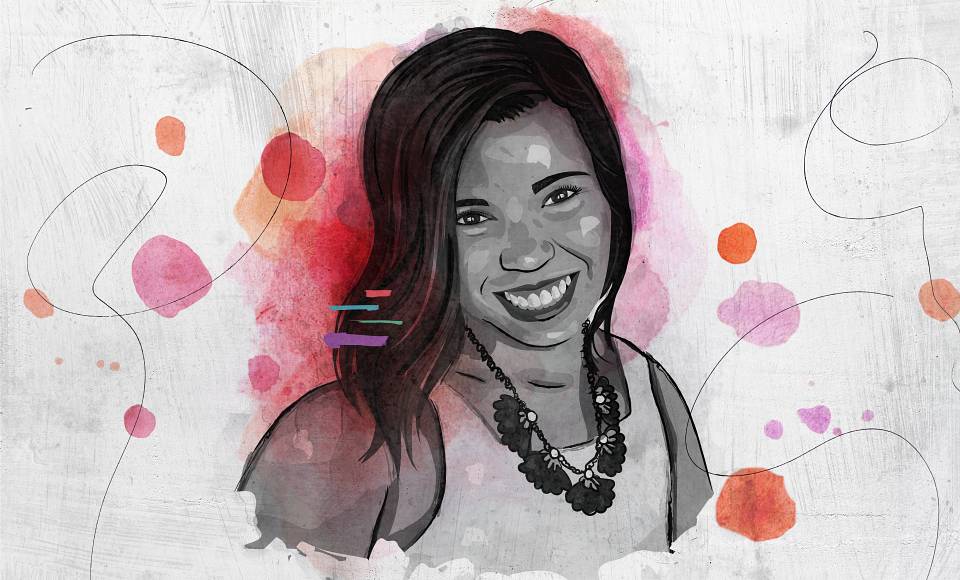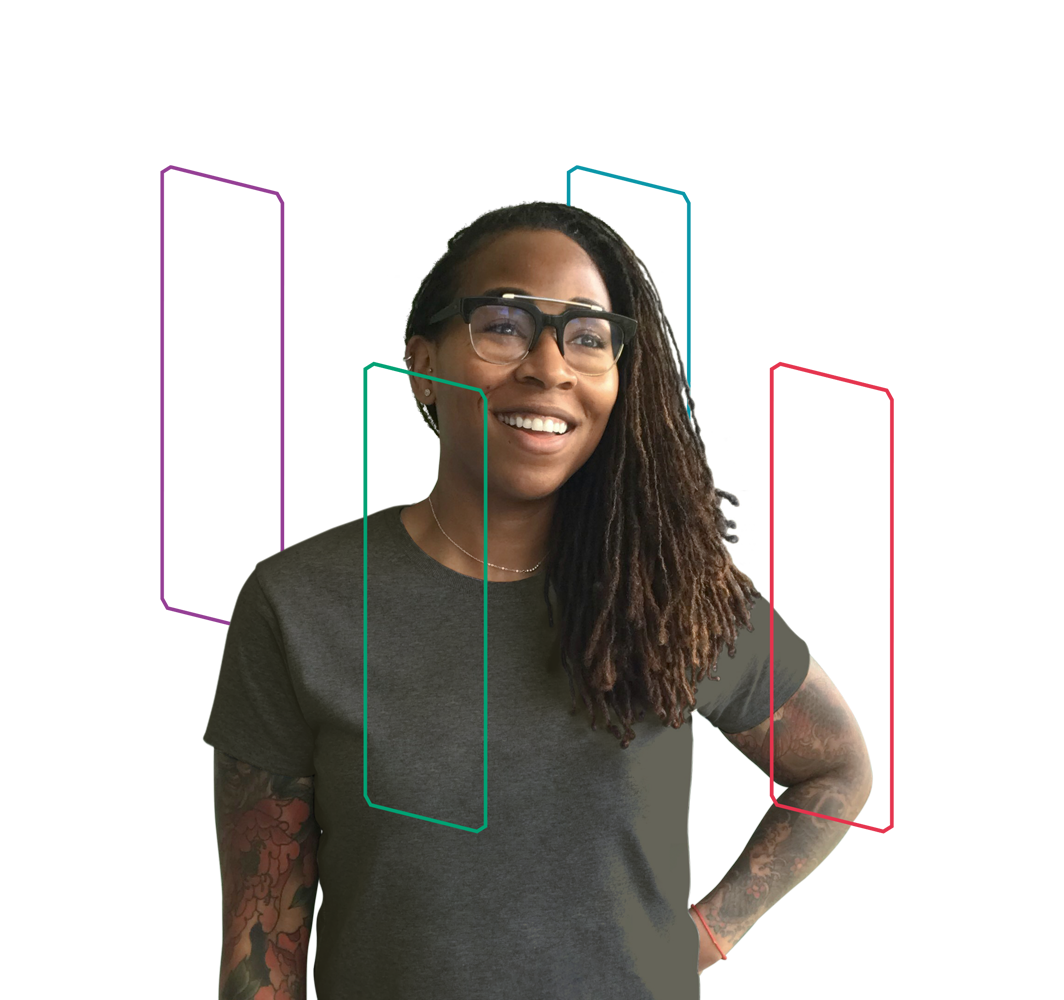Our Spotlight series highlights a new nurse from the SHIFT audience each month. We ask the same set of questions each time, but of course, we get all kinds of answers. The individual stories and surprise twists in these conversations make us laugh and cry — and fill us with pride about nursing. Over time, we hope to both discover what makes each of us unique and what ties all of us together as nurses.
From treating a child’s bee sting when she was a teenager to advocating for patients who have little-to-no access to health care in St. Louis, Mo., Emma C. has been buzzing around community health her whole life.
Emma is a natural advocate and go-getter for her community — and we so admire that about her! In 2019, while working on her dissertation for her doctorate of nursing practice, she partnered closely with Community Health-in-Partnership Services (CHIPS) a free and charitable clinic for the uninsured, on a quality improvement project — and hasn’t left since.
Now the community health nurse at CHIPS, Emma continues to champion the St. Louis community and the uninsured by advocating for the expansion of Medicaid in Missouri.
Why did you decide to go into nursing?
I started lifeguarding when I was 14, and one of the kids came up to me and he said he had been stung by a bee at the pool. I took care of him, bandaged him up, and his mom was so thankful. And I thought, “That was nice!” I just fell in love with first aid and taking care of people. My grandfather was actually a nurse anesthetist at the Veterans Administration in St. Louis, too. So after all of that, I decided to go to college to be a nurse.
I hit a few bumps, but after five years, I got my bachelor’s degree in nursing from the University of Missouri. I was actually twice denied entry into nursing school because of my GPA. But on Christmas Eve of 2010, I got a call from the University of Missouri in St. Louis asking if I could start in January for the nursing program. And I said yes! It just happened and worked out the way it was supposed to.
During nursing school, I started working at one of the hospitals in St. Louis in an internship position. I became a certified nursing assistant (CNA) on the floor for a year. That’s something I highly recommend, to work as a nurse tech or CNA. Getting the full experience of bed baths and checking blood glucose, vital signs and all the things that CNAs have to do. It helped me become a better nurse and team member.
Tell us about a time when it was really hard to be a nurse or a time that made you question being a nurse.
There’s a lot. Definitely when patients were being discharged. That was one of the hardest times for me as a nurse, because I’m someone who likes things packaged and wrapped and tied with a bow before I send it out into the world. I had to learn that wasn’t the real world. People would say, my medicine is going to cost this much, and I need a prior authorization, and I didn’t know a lot of how to navigate the care coordination part of health care for people. A lot of the cases that are put together to make sure people get the health care they need — it doesn’t flow very well. Noticing those patterns of not having a PCP or being unable to afford care and trying to get those things together before they leave the hospital was the hardest thing for me — and it never went smoothly. Sometimes even for people who had health insurance.
In Missouri, we did not expand Medicaid when the Affordable Care Act was put into place. We finally [voted to expand] Medicaid, but our governor is still holding back on it. So, for the people who were uninsured and underserved, there was no quality care or wellness access point that I knew of in the hospital. It wasn’t a puzzle piece that fit very well together.
After two years, I decided to go back to school to get my DNP, specifically focused on population health, because of that very problem. If we can’t even expand Medicaid or get health insurance for patients, how can we expect them to do all of this when they leave the hospital? If it was impossible for me, who has a license on a medical floor, to help them, I can’t imagine how it would feel to be a patient who is alone and not knowing health care at all. I’ve learned a lot, and a main goal is to help legislators understand the barriers. It shouldn’t matter if you have health insurance or not. You should be able to find a provider and have support. That’s been the driving force for me since I became a nurse.
There are so many gaps for that support system for those who need the most in our community. And I think these community centers can help to build a more stable foundation for all of us, an access point that is trusted. People love to know who they are coming to talk to. We do a lot of nursing assessments before they come in, making sure they are comfortable and know what we have to offer. I love it. It’s very freeing as a nurse.
Who inspires you?
Definitely Judy Bentley. She has been advocating for better community health her entire life, and she’s still running CHIPS, our clinic that serves thousands of people a year. Another is Pam, who is my clinical director at CHIPS. What’s amazing is that she’s in school to get her DNP, all while she’s running her community garden and her own circle-of-friends group for low-income seniors who are lonely. She does that every day and still shows up at the clinic. I admire how formidable she is in terms of her community.
Also, I have to include Congresswoman Cori Bush (who is also a nurse). She blows me out of the water every day. She has lived the life and helped others through their barriers. I’m proud to have somebody in legislation representing me and others.
Describe your SHIFT BFF. Why are they your best friend on the job?
There are six of us at CHIPS, so we’re close. They are wiser than me, and they have a lot of life experiences that I’ve been able to learn from. I love them very much, and they are all my best friends, every day.
I do have a BFF that I have had since I started my career. Carley is an ICU nurse now, but we started as CNAs together and we worked on the same floor. What I admire is the confidence she exudes and how much she’s an advocate for her patients. She helped me become more confident in the nursing profession, and I’ve realized that as nurses, we are a huge part of the team. She really inspired me to become a nurse leader.
Tell us something about your specialty in nursing that other nurses may not know.
Knowing how much paperwork we have to deal with! And just how hard it is for people to find access to resources in the community. Knowing that there are barriers for people who are uninsured and underserved, and that it’s not their choice. It’s a full-time job being underserved, and it’s hard work to find somewhere that will help you.
Describe your community’s health. What is your hope for your community’s health in the future?
Missouri is one of last states to expand Medicaid, which is a 10-year delay. We have a huge population that is uninsured. Where I work, the ZIP code is one of the highest rates for heart failure and diabetes and has the lowest rates of college education and access to transportation, air quality and access to quality food. Those disparities were hard to research for a long time, so it was hard to live in that community. That’s why CHIPS is so beautiful, because you have to be on the ground floor to understand how to build from that…. We have to show up every day, not just for ourselves, but also for our community. It falls back on us. Because if our community isn’t healthy and well, it ends up doing more harm. … We’re a good community. We just need overall access and support.
What is your vision for the future of nursing?
I would like to see nursing take on more of a leadership role in wellness and health outreach and in public health. I know that we need more nursing roles in both the hospital and clinical setting, and that we basically need nursing roles in general. I also know outreaching, navigating and care coordinating are difficult, but it saves lives. Prevention can’t just be for the rich — it has to be for everyone.
I would like to see nurses not just at the bedside but also knowing community resources and social determinants of health in their area, and acknowledging our own biases or how we might be privileged. A lot of nurses haven’t lived the lives that our patients have lived, so understand there are things that we have to get through as professionals and individuals as well so we can give the best care to everyone. That starts with your community and knowing the barriers, so that when patients ask you questions, you know the resources and the answers to help them.
How can nurses be better to each other?
Understanding the biases we have. Acknowledging that there’s racism in our profession. We need to understand where our history started, which isn’t just with Florence Nightingale. Black women led nursing in so many ways, and we’ve flourished because of black women. We need to acknowledge that. And really understand and shine a light on it all to get our profession back to caring for anyone, no matter who you are, where you come from or what life you lead.
We also have to be supportive of all education levels, because we need all the help we can get. Being supportive of LPN, BSN, DNP, and more. No matter what your education background is, your experience is always coming from life, community and work.
Describe one of your best shifts ever.
Our first COVID-19 vaccine day was chaos and so exhausting, but so rewarding, and l loved every second. We saw about 300 people that day, and they all came from either underserved, uninsured, low-income or public housing. Just seeing how happy people were to be there was wonderful, and we were so thankful they were there getting it.
That day, we were dancing! (And don’t we all want to be dancing after — or during — our shifts?!)
Learn more about Emma:
She’s on Instagram @emmacrockerdnp
Here’s her LinkedIn
These links are not endorsed by SHIFT and the views expressed within are their own.
If you’re interested in sharing your story for the SHIFT Talker Spotlight, please reach out here or email us at hello@shiftnursing.com.


